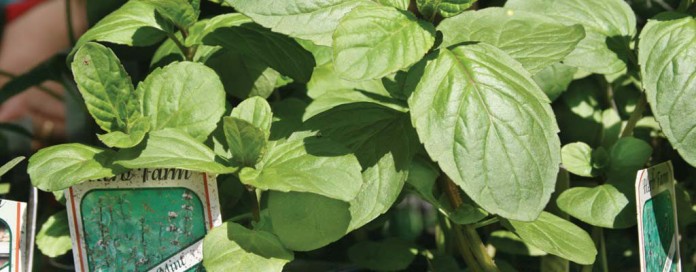SPRINGFIELD, Ohio — Growing herbs can add spice to the garden and the kitchen, said Pam Bennett, Ohio State University Extension horticulture educator and director in Clark County.
Bennett, who is also the statewide Master Gardener Volunteer Program coordinator and co-author of Garden-pedia: An A-to-Z Guide to Gardening Terms, offers these top 10 herb-growing tips:
1. Choose the right location for planting. “Herbs need full sun and well-drained soils,” Bennett said. “That’s the most important thing.”
2. If space is limited, choose herbs you will actually use in the kitchen or for other uses. “A lot of people like lavender — it looks nice and it smells beautiful — but it takes a lot of space and a lot of people end up not actually using it.”
3. Understand an herb’s growth characteristics before planting. “Mints, for example, are very popular and extremely easy to grow — so easy to grow that they become aggressive. They spread underground and send out shoots all over the place. Know what you’re getting into. If you want to grow mint, plant it in a container or contain it with a chimney flue set deep in the garden — really deep, maybe 4 feet would be a good idea. A 4- to 6-inch-deep barrier won’t work.”
4. Know the difference between annuals and perennials. Annuals grow from seed every year, but some can come back if you let them go to seed and allow them to repopulate. Dill, cilantro and chives are examples of annual herbs that are easy to grow and reseed readily, Bennett said. Basil is also a popular annual herb but is difficult to grow from seed. Perennials come back year after year. Oregano, sage and thyme are extremely easy perennials to grow and will come back each year. “Just cut them all the way back to the ground in the spring to rejuvenate the plant, and you’ll get great new growth,” Bennett said.
5. Basil is a popular herb — “a must-have if you like pesto or bruschetta,” Bennett said — but is a bit more tender than other herbs. “Don’t plant it in cold, wet soil, or the roots will rot,” she said.
6. Get an herbal two-for-one deal by planting cilantro. In spring, when the weather is still cool, you can harvest the leaves. When it starts getting warm, the plant will go to seed, making the leaves bitter, but the seeds the plant produces are coriander. Late in summer, as temperatures begin to cool, the coriander seeds will produce new cilantro plants for the fall. Dill also offers a similar deal: the feathery dill leaves can be used as an herb, and its seeds can be used in pickling.
7. Don’t over-fertilize. “Herbs don’t need a lot of nutrition. If you over-fertilize, they’ll get spindly. Regular garden fertilizer is fine, but they don’t need a lot of babying if you give them a good well-drained soil with a lot of organic matter.”
8. Harvest herbs in the morning when they’re rich in oils, typically when foliage is young and the plant isn’t in bloom. Deadhead flowers to encourage the plant to keep producing leaves.
9. To dry herbs, hang them, lay them on a tray or use a food dehydrator. Mint, thyme and sage are easy to dry. Once dry, store them in a cool location in a sealed container. Remove the leaves from the stem, or leave them whole and remove leaves as you need them.
10. During winter months, move any perennial herbs that you’ve grown in containers into a protected area — a basement window well, for example — to prevent freezing damage to the root system. Annuals can be brought inside, but by the end of the growing season, they’ll have become quite large. Bennett suggests harvesting some seeds and starting them in small pots, or taking cuttings in August, rooting them in a lightweight soil mix and then potting them. Even indoors during winter, they still need as much sunlight as possible, Bennett said. A south-facing window is a good choice. “And, just like a houseplant, the water requirements for indoor herbs are a lot lower during the winter months. Don’t overwater.”
More about growing herbs:
- How to grow herbs indoors Nov. 17, 2015
- How to grow, harvest and preserve herbs for tea March 13, 2015
- Herb gardens give many benefits April 15, 2013











